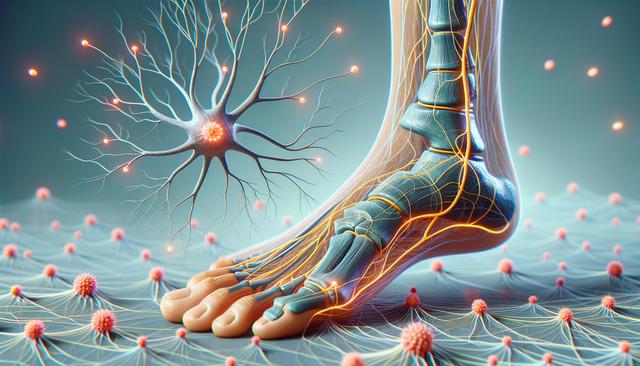What Is Foot Neuropathy?
Foot neuropathy, also known as peripheral neuropathy in the feet, refers to nerve damage that affects the peripheral nerves responsible for transmitting signals between the central nervous system and the lower extremities. This condition is particularly common among individuals with chronic illnesses, such as diabetes, but it can also result from various other medical issues, injuries, or lifestyle factors. The nerves in the feet are especially vulnerable because of their distance from the spinal cord and brain, making them more susceptible to damage.
Neuropathy can affect sensory, motor, and autonomic nerves. Sensory nerve damage may lead to unusual sensations like burning, sharp pain, or numbness. Motor nerve damage can result in muscle weakness, while autonomic nerve damage might impair sweat production or blood flow in the feet. Recognizing the type of nerve affected can be crucial in managing and treating the condition effectively.
Common Causes of Foot Neuropathy
There are multiple potential causes of foot neuropathy, and identifying the underlying issue is essential for proper treatment. Some of the most common causes include:
- Diabetes: One of the leading causes, often resulting in diabetic neuropathy due to prolonged high blood sugar levels damaging the nerves.
- Alcohol abuse: Chronic alcohol consumption can lead to nutritional deficiencies, particularly in B vitamins, which are vital for nerve health.
- Infections: Certain infections like Lyme disease, shingles, or HIV can lead to nerve damage.
- Medications: Some chemotherapy drugs and other medications may have neuropathy as a side effect.
- Autoimmune diseases: Conditions like lupus or rheumatoid arthritis can also result in nerve inflammation and damage.
Understanding the cause can help in tailoring a treatment plan that not only addresses symptoms but also targets the root of the nerve damage.
Recognizing the Symptoms
Foot neuropathy symptoms can vary widely, depending on the severity and type of nerves affected. Some people may experience mild discomfort, while others may suffer from debilitating pain or loss of function. Common symptoms include:
- Tingling or “pins and needles” sensation
- Burning or sharp stabbing pain
- Numbness or reduced ability to feel pain or temperature
- Muscle weakness or difficulty walking
- Foot ulcers or injuries that go unnoticed due to numbness
These symptoms often develop gradually and may worsen over time if not addressed. In some cases, symptoms may improve with treatment, especially when the cause is identified early and managed effectively.
Diagnosis and Medical Evaluation
Diagnosing foot neuropathy typically involves a combination of clinical evaluation, medical history, and diagnostic tests. A healthcare provider will first review symptoms, duration, and any existing medical conditions that could contribute to nerve damage. Physical exams often include checking reflexes, muscle strength, and sensory response in the feet.
Further diagnostic tools may include:
- Electromyography (EMG) and nerve conduction studies to measure electrical activity in muscles and nerves
- Blood tests to identify underlying conditions such as diabetes or vitamin deficiencies
- Imaging studies like MRI or CT scans to assess for structural problems or nerve compression
Early diagnosis is crucial for preventing further nerve damage and improving the chances of effective management. In some cases, referral to a neurologist may be necessary for a more detailed evaluation.
Management and Lifestyle Adaptations
Managing foot neuropathy often requires a multifaceted approach that includes medical treatment, lifestyle changes, and physical therapy. While the damage to nerves may not always be reversible, symptom relief and improved quality of life are achievable goals. Treatment options include:
- Medications such as pain relievers, antidepressants, or anti-seizure drugs that target nerve pain
- Physical therapy to maintain mobility and strengthen muscles
- Orthopedic supports like special footwear or braces to improve balance and reduce pressure on the feet
- Dietary adjustments to ensure adequate intake of vitamins and minerals essential for nerve health
Additionally, individuals with foot neuropathy should take extra care of their feet to avoid injuries. Daily foot inspections, moisturizing to prevent cracks, and avoiding walking barefoot are practical steps to reduce complications. Smoking cessation and limiting alcohol intake can also play a role in slowing the progression of neuropathy.
Conclusion: Living with Foot Neuropathy
Foot neuropathy can be a challenging condition, but with proper diagnosis and a comprehensive management plan, many individuals can maintain a good quality of life. Identifying the cause early, understanding the symptoms, and making appropriate lifestyle changes are key steps in dealing with this condition. Whether neuropathy arises from diabetes, medication, or another underlying issue, proactive self-care and regular medical follow-up can make a significant difference in managing symptoms and preventing complications.




Leave a Reply